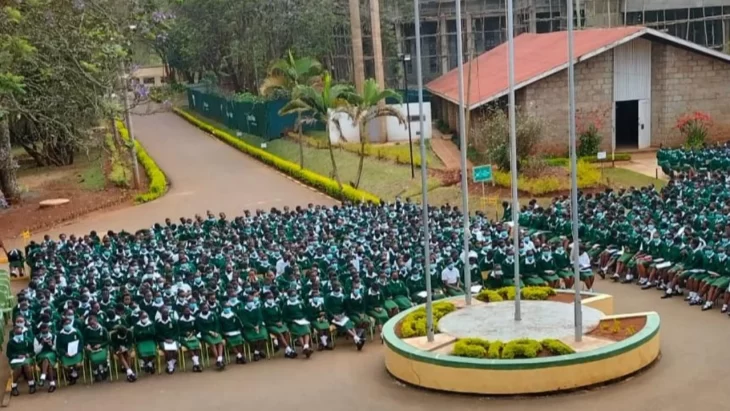NAIROBI, Kenya, May 30- The government has been challenged to make secondary education affordable, for the country to achieve a hundred percent transition.
According to the Economic Survey 2022, the number of students transitioning from primary to secondary school last year was the lowest compared to available statistics, over the last 5 years. According to the report, only 75.8 percent of learners moved from Primary to Secondary in 2021, compared to other years.
To reverse the worrying trend, Griffin Asigo, the Bridge Kenya Managing Director says the government should ensure that secondary school education is more affordable, especially for families from low-income communities.
“Secondary school education needs to be less of a financial burden to families,” the Bridge Kenya MD said.
He pointed out that, “even when primary schools support children to succeed and be academically prepared for secondary if it is too expensive for families to afford, it becomes challenging for children to transition from primary to secondary school.”
Asiago said the transition to secondary school is an important milestone in the lives of young people, as well as a period of adaptation that coincides with significant social, emotional and physiological changes in their lives.
“Giving a child the best in life is every parent’s dream but achieving this comes with amongst other things quality education. Obviously, a good education is a necessary tool for cementing a strong foundation for any child,” he said.
Unfortunately, he pointed out, because of the numerous financial obligations many parents cannot sustain timely school fee payments if at all, and struggle to send and keep their children in school.
In Kenya, the government requires families to share the costs at the secondary school level, which has significant negative consequences for children from poor families according to education experts.
Many children completing primary school fail to proceed to secondary school due to a lack of school fees or insufficient facilities.
This situation is distressing and has long-term consequences, such as teenage pregnancies and low earning potential, the Bridge MD said.
He noted that secondary school education plays a vital role in ensuring a country’s development through training.
“It provides the optimum setting to prepare young people for healthy and productive adult lives including participation in social, political, and economic spheres,” he said.
In addition, for societies to compete in the global economy, he said a significant number of their citizens need a secondary school education in order to acquire the specific skills and aptitudes necessary for an increasingly technology-driven market place.
Asiago added that the transition from primary school to secondary school has been affected by various factors which include the academic performance at the end of primary education, tuition fees charged by secondary schools when joining form one and inadequate availability of vacancies in secondary schools.
Financing secondary education has been a challenge for most households who live below the poverty line. Additional costs such as costs of uniforms, textbooks, and school maintenance make it impossible for learners to fully transit to secondary schools.
In 2018, for instance, 300,000 candidates who sat for the KCPE did not take their places in Form One.
To ensure a high rate of transition, the government introduced a universal transition programme that would ensure 100 percent transition to secondary school.
According to the World Bank, financing secondary education has been a big challenge to both the governments and households in Sub-Saharan Africa.
The World Bank notes that the household burden on financing secondary education is extremely high.
Bridge Kenya has been serving some of Kenya’s most underserved communities for well over a decade and has educated hundreds of thousands of children in Kenya.
Cost is a key barrier to transitioning to secondary school for the poor, who form the majority in sub-Saharan Africa.
Parents often cite a lack of funds for extra school levies such as transport, extra tuition, meals and school uniforms among others as the main reason for not enrolling their children in secondary schools.
The majority of the families live below the poverty line and spend most of their income on basic needs such as food and clothing and therefore, affording to meet the cost of education has become a challenge.
The Government of Kenya recognizes that expanding access to secondary education has been increasing but challenges remain, especially at the regional levels and in urban informal settlements. In order to achieve 100 percent transition, the Government in a mop-up exercise to trace all candidates, conducts an aggressive door-to-door campaign.
President Uhuru Kenyatta has reiterated the government’s goal to have all pupils join secondary school despite challenges associated with the 100 percent transition.
The President has said the government will do what it takes to expand physical facilities in existing institutions to ensure all pupils successfully transit to secondary school.
“We want all children in school. We shall build new infrastructure and expand existing ones after taking an assessment,” the President said during a previous event.
Recently, speaking during the inspection of Kenya Secondary Education Quality Improvement Project (SEQIP) infrastructural works at Butere Girls High School, Education Cabinet Secretary Prof. George Magoha ordered National Government Administrative officers to ensure all learners join secondary schools.
“The chiefs, together with their assistants, should be in the forefront in ensuring that our children are enlisted in various schools with the help of police. To obtain 100 percent transition, the administrators must ensure all 2021 KCPE students are in class throughout the year,” said Magoha.
The CS said that to realise 100 percent transition from primary to secondary schools, there was need for the administrators to trail the students and make them register in various learning institutions.
Want to send us a story? Contact Shahidi News Tel: +254115512797 (Mobile & WhatsApp)


